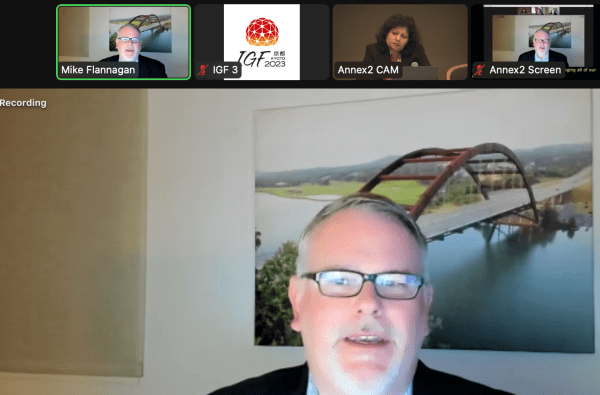In the ever-evolving landscape of data-driven progress, the promise of harnessing private sector data to achieve Sustainable Development Goals (SDGs) is crucial. However, it has become evident that the road to effective public-private data partnerships in the Global South is laden with challenges.
LIRNEasia together with CEPEI recently held a roundtable discussion at the 18th International Governance Forum (IGF) in Kyoto, Japan, on October 9, 2023 with the participation of a diverse panel of stakeholders from Africa, Asia, Latin America, the Caribbean, and the Middle East, who discussed many areas, including the private sector’s role in the data revolution, policy and practical challenges, and methods to overcome them.
 The session was moderated by LIRNEasia CEO, Helani Galpaya.
The session was moderated by LIRNEasia CEO, Helani Galpaya.
The panelists included:
1. Philipp Schönrock, Director (CEPEI)
2. Mike Flannagan, Corporate Vice President, Global Customer Success (Microsoft)
3. Isuru Samaratunga, Research Manager (LIRNEasia)
4. Darlington Akogo, Founder and CEO at minoHealth AI Labs
5. Rodrigo Iriani, Senior Program Manager (The Trust for the Americas)
6. Dr. Mona Demaidi, Entrepreneur, and Women’s Rights Advocate
The discussion underscored the importance of the private sector in contributing to the data revolution. From Philipp Schönrock’s insights on CEPEI’s and LIRNEasia’s initiatives to Mike Flannagan’s corporate perspective at Microsoft, the private sector is recognized as a crucial player in fostering data partnerships. Isuru Samaratunga from LIRNEasia highlighted specific examples of governments and data partnership facilitators that utilized private sector data in various problematic areas and achieved SDGs, by taking the participants through findings of a research done by LIRNEasia.
The panelists, including Dr. Mona Demaidi and Darlington Akogo, outlined challenges that have hindered the realization of the full potential of data partnerships. The lack of a conducive environment for data sharing, lack of incentives, policies that prevent data sharing, and low capacity of government procedures were identified as significant challenges.
To tackle these challenges head-on, the conversation also highlighted the need for governments to be more willing to have data partnerships and see the benefits of doing so. The panelists also shed light on the importance of developing governance structures to carry out these tasks and finally the private sector being more flexible in collaborations and sharing their data with the public sector.
Key takeaways:
- Public-private data partnerships have tangible benefits in moments of discontinuity or crisis. However, building relationships requires time and trust building, relying on informal relationships and intermediaries. Standard operating procedures may help. Data interoperability is also needed.
- Public-private data partnerships may require cross-border data sharing. The regulation of data protection and privacy is important. Political will is key.
Calls for action:
- Public sector: Public organizations should prioritize initiatives based on multiple local needs, including but not limited to the country’s developmental level, skills, and culture.
- Private sector: Standard operating procedures should be developed to facilitate monitoring and communication in initiatives, including clear contact points, timelines for periodic updates, resource planning, and fostering an interactive ecosystem.








Comments are closed.